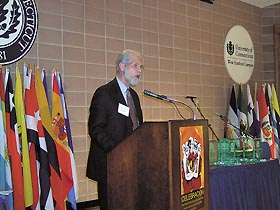|
This is an archived article.
For the latest news, go to the
Advance Homepage
For more archives, go to the Advance Archive/Search Page. | ||
|
Social Work School Celebrates On May 5 - Cinco de Mayo - more than 250 alumni and community leaders gathered to celebrate 30 years of Puerto Rican and Latino studies at the School of Social Work. The symbolism of the date - the anniversary of the day in 1862 when Mexicans defeated an invading French army - was not lost on the audience, for whom the occasion was an often-emotional recognition of the accomplishments of a community described by one speaker as still "highly invisible and vulnerable compared to other communities."
Julio Morales, a professor of social work and current chair of Puerto Rican and Latino Studies at the School, said the program originated in 1973, when a group of students began to organize the Hispanic Student Association, now the Latino Student Association. As a result of the group's efforts, in 1977 a new course was established, "The Puerto Rican Experience and Social Work Practice." Three years later, with the support of a federal grant, a new curriculum was approved that led to four new courses in Puerto Rican studies coupled with a field work placement, that formed an optional "substantive area" as part of the master's in social work degree. The project also funded two faculty positions and 10 scholarships, and in 1981 the School recruited 18 Puerto Rican and Latino students. The School has continued to support the project since the grant funding ended, and the program's accomplishment s have been many: they include studies of Latino dropouts, elderly Latinos, HIV/AIDS among Latinos (a study that led to the establishment of the Journal of HIV Prevention and Education and a group known as Latinos/as Contra SIDA), a yearly conference for Latino youth, and a national interactive satellite conference on child welfare, focusing on the Latino community. The faculty also developed a national model for recruiting Latino families as foster and adoptive families. There are now three faculty in the Puerto Rican and Latino Studies program and a fourth Latino faculty member. The School has graduated more than 400 Puerto Rican and Latino students since 1980. "The Latino gains and presence at this school must not be eroded," said Morales. State Rep. Evelyn Mantilla said the UConn program has resulted in "changes not only in professional lives of those who have graduated and those to come, but changes in hundreds of thousands of other lives, as the students have gone out into community as leaders in many areas, not only in social work, but in politics, the judicial department, the media and elsewhere." "Every little drop of water each one of you has contributed to our community," she told the audience of mostly alumni, "has amounted to a river of change." Keynote speaker Mar’a Josefa Canino, director of the doctoral program at the University of Puerto Rico School of Social Work, with which the UConn School of Social Work has an exchange program, traced the history of ethnic studies programs nationally. She said in the late 1960s and early 1970s, a few black, Puerto Rican, and Chicano students gained admission to higher education as part of the broader civil rights movement. "These students politically and intellectually confronted universities and the nation, and demanded attention to the social and economic needs of their respective communities," she said. "The subsequent funding in the 1970s of undergraduate ethnic studies programs took place at a time of great effervescence." The Puerto Rican and Latino Studies program at the UConn School of Social Work was one of just a handful of programs established at the graduate level, she said. Thirty years later, challenges remain, noted Canino. Ethnic studies are in most places treated like "second-class citizens," she said, adding that "universities need to provide short- and long-term support for work with ethnically defined populations and issues," for the sake of both the individual careers of faculty and students, and for the future of the country as a multi-racial, multi-ethnic nation. Ronald Taylor, vice provost for multicultural and international affairs, noted that in the 2000 census, Latinos were the largest minority population in the United States, and their share of the population is growing. "The Puerto Rican and Latino program at the School of Social Work is poised to respond to that challenge," he said. Jorge Sim—n, MSW '78, JD '82, presiding judge for the Hartford Judicial District Court, was one of eight alumni honored during the ceremony. "This is a rare honor," he said. "Over the next few days, a few social workers will say, 'he's a social worker?' And others will say 'he's a Latino?' It's those badges I take every day to the bench to attempt to administer justice in a way that brings fairness and equality to all who come before me." He added: "Even though they say we're the largest minority, that doesn't mean anything if we don't know how to use that power to bring about a social agenda that helps those in need and benefits our community." The other alumni honored for their contributions to social work practice and to the Puerto Rican and Latino communities were: Juan Brito, founder of Que Pasa, renamed El Extra News; Barbara Candales, director of Central Connecticut State University's social work program; Leticia Lacomba, principal deputy director for children and family services for the District of Columbia; Pablo Manuel Magaz, an expert on HIV/AIDS; Maria Martinez, director of the center for academic programs at the University of Connecticut; Migdalia Reyes, associate dean at the San JosŽ University College of Social Work; and Nelly Rojas Schwan, senior vice president for children's services, Village for Families and Children. Professor emerita Marcia Bok also was honored. Photos of the event are available at www.thewebpages.biz. |

